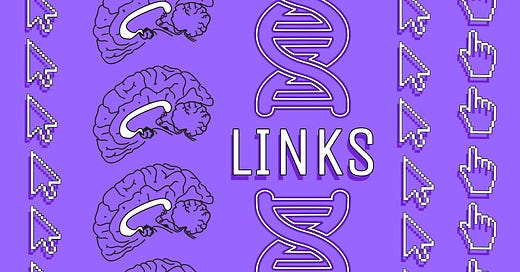Welcome to LINKS — my attempt to provide Rhapsody readers with five interesting stories that tell us something about what it means to be human. LINKS is published every Wednesday. Have a link you want to share? Drop it in the comments.
Half-million-year-old wooden structure unearthed in Zambia
By Victoria Gill, BBC News
“The discovery could transform the current belief ancient humans led simple, nomadic lives.
“‘They made something new, and large, from wood,’ Prof Barham said. ‘They used their intelligence, imagination and skills to create something they'd never seen before, something that had never previously existed.’”
Box of donated artifacts turns out to be treasure trove of Neanderthal bones
By Bob Yirka , Phys.org
“Back in the late 1970s, amateur paleontologist Miguel Aznar uncovered a vast assortment of artifacts and bones outside of a cave called Cova Simanya, which is located in a park just outside of Barcelona. Aznar cleaned the materials and gave them a cursory inspection and then dumped them all together in a box. He then put them in a storage bin at his home, where they stayed until 1986; the year he donated the box to the Archaeology Museum of Catalonia, where it sat unexplored until 2020.”
Rethinking the Luddites in the Age of A.I.
By Kyle Chayka, The New Yorker
“The workers destroying the lace frames were the group who called themselves Luddites, after Ned Ludd, a (likely fictional) knitting-frame apprentice near Leicester who was said to have rebelled against his boss by destroying a frame with a hammer. Today, the word ‘Luddite’ is used as an insult to anyone resistant to technological innovation; it suggests ignoramuses, sticks in the mud, obstacles to progress. But a new book by the journalist and author Brian Merchant, titled ‘Blood in the Machine,’ argues that Luddism stood not against technology per se but for the rights of workers above the inequitable profitability of machines. The book is a historical reconsideration of the movement and a gripping narrative of political resistance told in short vignettes.”
Is Consciousness Part of the Fabric of the Universe?
By Dan Falk, Scientific American
“Scholars recently gathered to debate the problem at Marist College in Poughkeepsie, N.Y., during a two-day workshop focused on an idea known as panpsychism. The concept proposes that consciousness is a fundamental aspect of reality, like mass or electrical charge. The idea goes back to antiquity—Plato took it seriously—and has had some prominent supporters over the years, including psychologist William James and philosopher and mathematician Bertrand Russell. Lately it is seeing renewed interest, especially following the 2019 publication of philosopher Philip Goff’s book Galileo’s Error, which argues forcefully for the idea.”
The Spirits of Yakushima
By Steve Atkins & Rob Martland, Aeon
A small island off the south coast of Japan, Yakushima is a UNESCO World Heritage site known for its lush forests, grand mountains and ancient cedar trees, some of which are thousands of years old. For the UK filmmaker Steve Atkins, Yakushima had long been a distant dream – a mythical forest painted in his imagination by the celebrated Japanese animator Hayao Miyazaki’s animated classic Princess Mononoke (1997), which had enchanted him since his youth. When he later learned that Yakushima had inspired the mystical forests of Miyazaki’s film, he resolved to travel to the island in a quest driven by passion, spiritual curiosity and artistic instinct.




